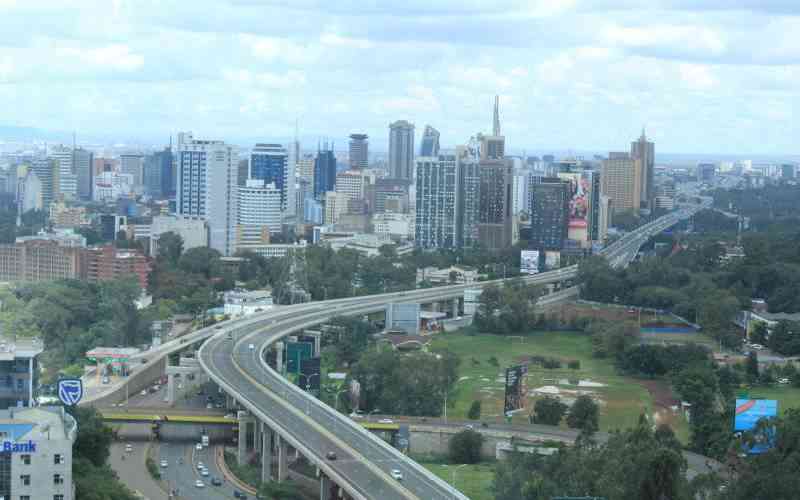A section of Narobi Expressway as captrured from Westlands on April 23, 2025. [Benard Orwongo, Standard]
African heads of state will gather in Luanda from October 28-31 for a high-stakes summit aimed at closing the continent’s $100 billion annual infrastructure funding gap.
The event, hosted by Angola in partnership with the African Union Development Agency (AUDA-NEPAD) and the African Union Commission (AUC) seeks urgent solutions as countries like Kenya struggle to finance stalled projects.
Kenya and other African countries faces a critical shortfall in infrastructure investment.
While the continent needs $130-$170 billion yearly for roads, power grids, ports, and digital networks, only about $80 billion is secured.
Follow The Standard
channel
on WhatsApp
Key continental initiatives like the Programme for Infrastructure Development in Africa (PIDA)– a continental blueprint for transformative cross-border projects – require $16 billion annually but consistently miss targets.
A parallel goal is mobilizing $1.3 trillion by 2040 for a continent-wide single electricity market.
Host nation Angola, currently chairing the African Union, will showcase its $6 billion Lobito Corridor as a success model.
This transnational rail and port network links Angola to Zambia and the Democratic Republic of Congo (DRC), attracting US and European investment.
It aligns with the African Continental Free Trade Area (AfCFTA), designed to boost intra-African trade.
“Infrastructure is an essential pillar of Africa’s future,” in a statement stated Angolan President João Lourenço, who has prioritized cross-border projects.
“We must mobilize all financial resources – for roads, railways, ports, power lines, and digital networks.”
The event responds directly to President Lourenço’s call for action.
Key features will include curated sessions where governments pitch portfolios to investors, targeting funding for regional corridors (like Kenya’s LAPSSET corridor linking Lamu Port to South Sudan/Ethiopia, and the Dakar-Bamako-Djibouti route), power projects, logistics hubs, and digital infrastructure.
A critical assessment of progress on Africa’s flagship infrastructure program, addressing chronic execution delays.
Participants will explore finance mechanisms to provide electricity for over 600 million Africans currently without power, leveraging initiatives like the African Single Electricity Market (AfSEM).
Discussions will also explore unlocking Africa’s $70 billion in pension and sovereign wealth funds; “de-risking” Public-Private Partnerships (PPPs) using blended finance (mixing public, private, and concessional funds); financing climate-resilient infrastructure; and building AI-ready digital backbones for trade.
The summit aims to move beyond pledges to binding commitments for Africa’s infrastructural transformation.
Follow The Standard
channel
on WhatsApp
African heads of state will gather in Luanda from October 28-31 for a high-stakes summit aimed at closing the continent’s $100 billion annual infrastructure funding gap.
The event, hosted by Angola in partnership with the African Union Development Agency (AUDA-NEPAD) and the African Union Commission (AUC) seeks urgent solutions as countries like Kenya struggle to finance stalled projects.
Kenya and other African countries faces a critical shortfall in infrastructure investment.
While the continent needs $130-$170 billion yearly for roads, power grids, ports, and digital networks, only about $80 billion is secured.
Follow The Standard
channel
on WhatsApp
Key continental initiatives like the
Programme for Infrastructure
Development in Africa (PIDA)– a continental blueprint for transformative cross-border projects – require $16 billion annually but consistently miss targets.
A parallel goal is mobilizing $1.3 trillion by 2040 for a continent-wide single electricity market.
Host nation Angola, currently chairing the African Union, will showcase its $6 billion Lobito Corridor as a success model.
This transnational rail and port network links Angola to Zambia and the Democratic Republic of Congo (DRC), attracting US and European investment.
It aligns with the African Continental Free Trade Area (AfCFTA), designed to boost intra-African trade.
“Infrastructure is an essential pillar of Africa’s future,” in a statement stated Angolan President João Lourenço, who has prioritized cross-border projects.
“We must mobilize all financial resources –
for roads, railways
, ports, power lines, and digital networks.”
The event responds directly to President Lourenço’s call for action.
Key features will include curated sessions where governments pitch portfolios to investors, targeting funding for regional corridors (like Kenya’s LAPSSET corridor linking Lamu Port to South Sudan/Ethiopia, and the Dakar-Bamako-Djibouti route), power projects, logistics hubs, and digital infrastructure.
A critical assessment of progress on Africa’s flagship infrastructure program, addressing chronic execution delays.
Participants will explore finance mechanisms to provide electricity for over 600 million Africans currently without power, leveraging initiatives like the African Single Electricity Market (AfSEM).
Stay informed. Subscribe to our newsletter
Discussions will also explore unlocking Africa’s $70 billion in pension and sovereign wealth funds; “de-risking” Public-Private Partnerships (PPPs) using blended finance (mixing public, private, and concessional funds); financing climate-resilient infrastructure; and building AI-ready digital backbones for trade.
The summit aims to move beyond pledges to binding commitments for Africa’s infrastructural transformation.
Follow The Standard
channel
on WhatsApp
By Brian Ngugi


